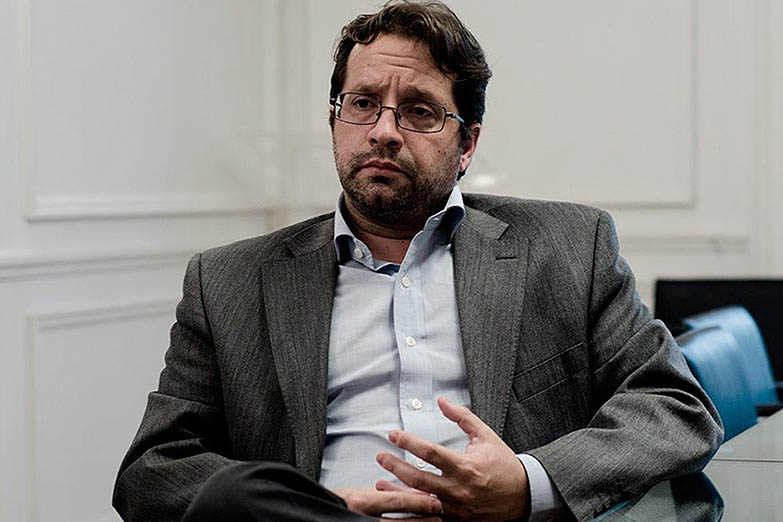peppertree
peppertree's JournalArgentina's Karinagate: 19 indicted on racketeering charges
The former head of the now-defunct National Disability Agency (ANDIS), Diego Spagnuolo, was prosecuted on Monday along with 18 other people — including former government officials and representatives of pharmaceutical companies — in a probe investigating a bribery scheme that operated within that state sector.
Spagnuolo has been prosecuted for illicit association, fraud against the public administration, bribery, carrying out negotiations that were incompatible with his role as a public official, and infringement of the law regulating the ethics of public service.
Spagnuolo was the most prominent figure among the 19 indicted Milei officials and pharmacy chain executives - alleged partners in what Federal Judge Sebastián Casanello called "a criminal structure that operated within the agency as a means of enrichment and to the clear detriment of the agency's public mandate: the protection and care of the disabled."
Prosecutors found nearly US$30 million in "reduced bidding" ANDIS contracts between July 2024 and August 2025.
The scandal broke in August 2025 with the leak of several audios attributed to Spagnuolo, in which Presidency Secretary Karina Milei — President Javier Milei’s sister — and her right-hand man, Eduardo "Lule" Menem, were accused of running the bribery scheme.
The system consisted of taking bribes from pharma and medical companies in exchange for state contracts. The voice in the audios said that Karina Milei took 3% of each contact as bribes.
The audios were not included as evidence in the case, and Karina Milei and Lule Menem were not prosecuted.
At: translate.google.com/translate?sl=es&tl=en&hl=en&u=https://www.politicargentina.com/notas/202602/71659-escandalo-en-andis-procesaron-a-diego-spagnuolo-y-a-otras-18-personas-por-corrupcion.html&client=webapp
Disgraced National Disability Agency (ANDIS) director Diego Spagnuolo poses between Argentine President Javier Milei, and his sister and chief of staff, Karina Milei, in a 2023 campaign photo.
Spagnuolo - who shares a lawyer with Milei and Argentina' top convicted drug trafficker, Fred Machado - was one of 19 people indicted today in the ANDIS bribery scandal.
Critics noted, however, that none in the Kovalivker family - who control the Suizo Argentina pharmacy chain - or Milei's Chief of Staff Karina Milei - whose "3% share" in the bribery scheme was detailed by Spagnuolo in recordings - were included in the indictment.
Milei responded to the scandal by shuttering ANDIS.
Head of Argentina's statistics bureau forced out by Milei amid controversy over new inflation index
Marco Lavagna resigned unexpectedly as director of Argentina’s statistics institute INDEC on Monday, after six years at the post serving two presidents.
The news comes just eight days before the institute was set to publish January’s inflation figures, calculated with a formula INDEC authorities said would better reflect purchasing power.
Economy Minister Luis Caputo said Lavagna, 51, will be replaced by Pedro Lines, who has served in the INDEC since 2016 and has been its technical director since 2018.
Political dismissal
Lavagna’s announcement surprised a great deal of government officials and workers.
“We are appalled,” said Raúl Llaneza, deputy secretary-general of the State Workers’ Association and a union representative for INDEC.
Llaneza added that Caputo’s announcement that INDEC would finally not publish January’s inflation rate with the updated methodology doesn’t give workers “peace of mind,” as everything was “up and running” to implement it.
“We find it strange, a justification that lacks technical rigor — it’s political, and we don’t think it’s right,” said Llaneza.
The updated CPI basket prepared by Lavagna's team before his ouster would have raised the share of housing and utilities in the new index from 9.4% to 14.5%, and of transport costs from 11% to 14.3%.
A University of Buenos Aires study found that utility costs have jumped 525% since President Javier Milei took office in late 2023, with public transport costs skyrocketing by 912% - or ten-fold.
At: https://buenosairesherald.com/economics/argentinas-indec-head-steps-down-on-heels-of-new-index-debut
The now former director of Argentina's INDEC statistics agency, Marco Lavagna, during a 2021 interview.
Lavagna's dismissal by the far-right President Javier Milei rattled markets, as his ouster was quickly linked to his introduction of a revised CPI index - which would have raised estimated inflation in Milei's first two years in office from 249.5% to 288.2%.
The new CPI index prepared by Lavagna's team - promptly scrapped by the new INDEC authorities - would have raised the 2024 inflation rate from 117.8% to 123.3%, and the 2025 rate from 31.5% to 33.5%.
Argentina's Mileise: Infant mortality and other vital statistics deteriorate markedly in 2024
Data published on Friday by Argentina's Health Statistics and Information Directorate (DEIS) shows a marked deterioration during 2024 in all major vital statistics for the South American nation of 47 million.
The shift, which breaks over 50 years of nearly-uninterrupted improvements in national health indicators for Argentina, came amid deep budget cuts in health and education during far-right President Javier Milei's first year in office - enacted largely by decree.
Public health observers were especially worried by a worsening infant mortality rate - which rose from 8.0 to 8.5 per 1,000 live births (compared to 5.5 in the U.S. and 6.2 in neighboring Chile and Uruguay).
The 6.3% jump was the highest such increase since 1970 - when similar cuts to public health budgets by the right-wing dictatorship of Gen. Juan Carlos Onganía triggered a nationwide strike by public-sector medical staff.
Maternal mortality rose even more sharply: from 31.9 per 100,000 live births to 44.3 - far higher than the 17.9 recorded in the U.S. (itself the highest in the developed world).
Overall death rates rose as well, with registered deaths rising by 6.5% - the sharpest rise, excluding the height of the COVID-19 pandemic in 2020-21, since 2007.
Much of the increase came from respiratory (14.5%) and circulatory (5.7%) causes - though a sharp rise (10.4%) was also noted in septicemia deaths; COVID-19 deaths, on the other hand, fell by 64.5% to just 791 as the pandemic wound down.
Critics note a two-thirds reduction in the number of basic medicine kits distributed to needy seniors under the REMEDIAR program during Milei's first two years in office.
Empty cribs
Birth rates, in turn, declined sharply in 2024 - intensifying a trend that began in 2016, after right-wing President Mauricio Macri slashed transport, public utility and educational subsides.
Registered births plummeted by 10.4% - far steeper than the 6.2% average decline seen during the country's birth dearth since then.
The number of total births (413,135) was the lowest since 1948 - with birth rates in 2024 (8.9 per 1,000 population) a mere half of their 2015 levels, and well below the 10.6 recorded in the U.S.
The Argentine population's natural increase - the difference between births and deaths - thus plunged to levels not seen since the 19th century: just 36,730 - a fry cry from the 419,000 annual average between 1975 and 2015.
Argentina's National Population Directorate estimates that the country's 2025 population (46,735,000) was nearly 300,000 less than the 2023 total - owing to a 20% decline in the number of foreign-born residents since then.
Around 600,000 registered jobs have been lost since Milei was elected in November 2023.
At: https://www-pagina12-com-ar.translate.goog/2026/01/31/cuando-el-estado-se-retira-la-salud-es-lo-primero-que-se-pierde/?_x_tr_sl=es&_x_tr_tl=en&_x_tr_hl=en-US&_x_tr_pto=wapp
And: https://www.argentina.gob.ar/sites/default/files/serie_5_nro_68_anuario_vitales_2024_v2.pdf
Argentine senior citizens in Buenos Aires protest earlier this month over the declining real value of their pensions, which average under US$300 a month.
Cuts to federal prescription subsidies and public health, along with a decade-long slide in real wages (with minimum wages losing 60% of their real value), have combined to slash birth rates in half since 2015 while death rates have creeped upward - a birth dearth comparable to Eastern Bloc countries during the 1990s, and among the sharpest in recorded history.
Argentina's population, according to its own statistical authorities, is now declining.
Despite Trump bailout, Argentina slips back into recession in November
Data published today by Argentina's Statistics and Census Institute (INDEC) showed the country's economy shrinking by 0.3% in November, compared to a year earlier.
Declines were most severe in fisheries (-25%), manufacturing (-8.2%), retail and wholesale commerce (-6.4%), and construction (-2.3%).
As in most of far-right President Javier Milei's two-year rule, significant growth was recorded only in finance (13.9%), agriculture (10.5%), and mining and extraction (7.0%).
The country's economy - Latin America's third-largest - declined a seasonally-adjusted 0.3% in November from October. The fifth such decline in nine months, it left GDP just 0.8% higher than in November 2023 - the last full month of the embattled, center-left Alberto Fernández administration.
The monthly decline - the second in a row - comes after U.S President Donald Trump pledged $20 billion to bail out the hard currency-strapped nation of 47 million ahead of mid-term elections in October (which Milei's party unexpectedly won).
Argentine officials on January 9 announced the repayment of the $2.5 billion drawn.
Mixed results
For the first eleven months of the year, GDP grew 4.5% - the best showing since 2022 and a rebound from the 2.0% decline in January-November 2024, when the impact from Milei's sharp austerity measures hit hardest.
The country recorded a $1.8 billion budget surplus in 2024, and just over $1 billion in 2025 - in sharp contrast to the $27 billion deficit recorded in 2023 (4.4% of GDP - compared to 6.2% in the U.S.).
The austerity measures are credited by Milei with helping reduce inflation to 31.5% last year - the lowest in eight years, and a dramatic improvement from around 211% in 2023 and 118% in 2024.
Argentina's labor market has borne the brunt of austerity, however, with the number of registered workers falling by 585,000 - or 4.4% - from November 2023 to October 2025 (the latest data available).
And while Milei pledged to "take a chainsaw" to public sector employees he often referred to as "the caste" during his 2023 campaign, seven out of eight jobs lost (some 513,000) have been in the private sector.
A net 21,000 employers (4.1% of the 2023 total) went out of business in Argentina during that period.
At: https://www-eldestapeweb-com.translate.goog/economia/actividad-economica/la-actividad-economica-volvio-a-caer-en-noviembre-empujada-por-el-derrumbe-de-la-industria-y-el-comercio-202612116944?_x_tr_sl=es&_x_tr_tl=en&_x_tr_hl=en&_x_tr_pto=wapp
Former President Alberto Fernández (center) poses with staff and public officials at Whirlpool's new factory in Pilar, Argentina, in June 2023.
Following two years of austerity and free-trade measures enacted (largely by decree) by his right-wing successor, Javier Milei, however, the U.S. appliance maker announced on November 26 that it would shutter the plant - adding some 220 workers to Argentina's growing ranks of unemployed.
Chris Rea, 1951-2025
What's in the Huge Military Bill Heading to Trump?
Congress has now passed the National Defense Authorization Act for fiscal year 2026, a sprawling $901 billion measure that includes everything from a pay raise for troops to several direct challenges to President Donald Trump’s authority.
It’s easy to get lost in this 3,000-plus-page measure, but there are also consequential details you shouldn’t miss:
It requires the Defense Department to give Congress the specific orders to carry out strikes targeting boats the administration says were carrying drugs to the United States. Administration officials have not publicly provided evidence for that charge.
The administration has not sought congressional authorization for use of force even as it has carried out 26 strikes so far.
The second provision forbids Trump from reducing the number of troops permanently stationed in or deployed to Europe below 76,000 for more than 45 days.
There’s also one notable thing the legislation doesn’t do: It retains the “Defense Department” label rather than Trump’s preferred name, “Department of War.”
The legislation repeals the 1991 and 2002 authorizations for use of military force against Saddam Hussein’s Iraq.
At: https://www.usnews.com/news/u-s-news-decision-points/articles/2025-12-18/whats-in-the-huge-military-bill-heading-to-trump
Trump's glowing account of progress is at odds with his government's own stats
President Donald Trump’s glowing account of progress under his watch Wednesday was out of tune with the experience of price-squeezed Americans and the story told by some of his government’s own statistics.
In a speech from the White House, Trump assailed the record of his Democratic predecessor and boasted expansively about his record so far. Not all of those boasts were credible.
Among them:
On inflation
His claim that prices are falling rapidly is not seen in the inflation numbers, which are about where they were when he took office, after having fallen significantly before the end of Joe Biden’s presidency. Nor is it true that the Biden era gave the country its worst inflation ever.
The consumer price index was 3% in September, the same rate as in January, a tick up from 2.9% in December, Biden’s last full month in office.
On investment
“I secured a record-breaking $18 trillion of investment into the United States.”
Trump has presented no evidence that he’s secured this much domestic or foreign investment for the United States.
A landslide?
Trump won a decisive victory but hardly a landslide one, however you define a landslide.
At: https://apnews.com/article/trump-speech-fact-check-inflation-9d18903505dae93beb783594e435c72b
Here comes Santa Crock...
Chile becomes first nation outside Germany to elect the son of a known Nazi
Chile has taken a decisive turn to the right after José Antonio Kast, a hardline conservative, won the country's presidential runoff, following a campaign dominated by fears over crime, migration and economic uncertainty.
With over 95% of ballots counted, Kast, the leader of the Republican Party, secured roughly 58% of the vote.
His rival, Communist Party candidate Jeannette Jara, who received just over 41% of the vote, called to concede defeat and wrote on social media, "Democracy spoke loud and clear." Outgoing President Gabriel Boric also phoned Kast to congratulate him.
Kast is set to take office March 11, 2026. He has pledged to give undocumented migrants until that date to leave the country, warning that those who remain would face deportation or prosecution.
At: https://www.npr.org/2025/12/14/nx-s1-5644074/chile-kast-right
Chilean President-elect José Kast beams after voting earlier today in Santiago.
A staunch admirer of former dictator Augusto Pinochet, Kast will become the first president since Chile's return to democracy in 1990 to openly support the former military regime.
His father, Michael Kast, was a member of the Nazi Party who fought in the German Wehrmacht during World War II before emigrating to Chile in 1950.
Kast's bother Miguel, in turn, served as Central Bank President during the country's 1982-83 foreign debt bubble collapse.
Veteran Argentine actor Hector Alterio dies in Madrid aged 96
Beloved Argentine-born actor Héctor Alterio has died in Madrid at the age of 96, his family announced on Saturday in a statement released by the producers of his final production Una pequeña historia (“A Small Story”).
Born in Buenos Aires in 1929, Alterio made his stage debut in 1948 - and although he achieved fame on screen, the talented actor continued to perform in theatre until shortly before his death.
In 1975, just before the onset of Argentina's brutal military dictatorship, he went into exile in Spain after receiving death threats from the Argentine Anti-Communist Alliance, or Triple A.
In exile, he began a long association with Spanish cinema, appearing in films such as El crimen de Cuenca (“The Crime of Cuenca”) and A un dios desconocido (“To an Unknown God”), his performance in the latter winning him the Best Actor award at the San Sebastián International Film Festival.
Despite settling in Spain, he never stopped performing in Argentine films. He starred in four national films nominated for Academy Awards, including La tregua (“The Truce,” 1974), Camila (1984) and El hijo de la novia (“Son of the Bride,” 2001).
Most notably, Alterio starred as the right-wing adoptive father of a toddler abducted by the last dictatorship in La historia oficial ("The Official Story," 1985) - which won the 1986 Oscar for Best Foreign Language Film.
Alterio, who also held Spanish nationality, was described by the Spanish film academy as “one of the most outstanding performers of his generation.” In 2004 he was awarded the Goya Award for Lifetime Achievement for his career.
At: https://www.batimes.com.ar/news/amp/culture/veteran-actor-hector-alterio-dies-in-madrid-aged-96.phtml
Veteran Argentine actor Héctor Alterio, portraying a right-wing Argentine financier, confronts his left-wing family over the country's collapse at the end of the fascist last dictatorship in the Oscar-winning The Official Story (1985).
Spanish Prime Minister Pedro Sánchez wrote on X that he was “deeply sorry” at the actor’s passing, calling him an immense and beloved performer whose talent and humanity will live on in his work.
Veteran Argentine actor Hector Alterio dies in Madrid aged 96
Beloved Argentine-born actor Héctor Alterio has died in Madrid at the age of 96, his family announced on Saturday in a statement released by the producers of his final production Una pequeña historia (“A Small Story”).
Born in Buenos Aires in 1929, Alterio made his stage debut in 1948 - and although he achieved fame on screen, the talented actor continued to perform in theatre until shortly before his death.
In 1975, just before the onset of Argentina's brutal military dictatorship, he went into exile in Spain after receiving death threats from the Argentine Anti-Communist Alliance, or Triple A.
In exile, he began a long association with Spanish cinema, appearing in films such as El crimen de Cuenca (“The Crime of Cuenca”) and A un dios desconocido (“To an Unknown God”), his performance in the latter winning him the Best Actor award at the San Sebastián International Film Festival.
Despite settling in Spain, he never stopped performing in Argentine films. He starred in four national films nominated for Academy Awards, including La tregua (“The Truce,” 1974), Camila (1984) and El hijo de la novia (“Son of the Bride,” 2001).
Most notably, Alterio starred as the right-wing adoptive father of a toddler abducted by the last dictatorship in La historia oficial ("The Official Story," 1985) - which won the 1986 Oscar for Best Foreign Language Film.
Alterio, who also held Spanish nationality, was described by the Spanish film academy as “one of the most outstanding performers of his generation.” In 2004 he was awarded the Goya Award for Lifetime Achievement for his career.
At: https://www.batimes.com.ar/news/amp/culture/veteran-actor-hector-alterio-dies-in-madrid-aged-96.phtml
Veteran Argentine actors Héctor Alterio and Norma Aleandro confront each other over the realization they have adopted a toddler abducted by the fascist last dictatorship in the Oscar-winning The Official Story (1985).
Spanish Prime Minister Pedro Sánchez wrote on X that he was “deeply sorry” at the actor’s passing, calling him an immense and beloved performer whose talent and humanity will live on in his work.
Profile Information
Member since: Thu May 18, 2017, 11:36 AMNumber of posts: 23,249






